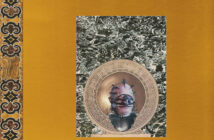
Zeitkratzer are most well known for their realisation of Lou Reed’ Metal Machine Music on chamber instruments, and hence their reputation as an ensemble capable of performing the unperformable. They’ve also played Merzbow, Fennesz, Terre Thaemlitz and Whitehouse, favouring interdisciplinary collaboration and intent on disrupting the purity of new music: ‘Music, especially new music, thrives on continuous contamination.’ With their series of ‘Old School’ recordings however, they tackle established new music ‘classics’, John Cage, Alvin Lucier, Morton Feldman and here, the criminally under-recorded American composer James Tenney.
Tenney’s music has long been part of Zeitkratzer’s repertoire, and seems tailor-made to their aesthetic. Like Scelsi, Tenney is fascinated in the perceptible shifts in sound texture brought about by small changes in tone and timbre, his aleotoric scores inviting varied interpretations but single-minded in their pursuit of clear musical objectives. The three pieces here explore variants of Tenney’ “pure tuning’ approach and result in a series of rich drones, like Phil Niblock but shifty and fluctuating, more dramatic, and considerably more rewarding.
“Critical Band’ centres on a winding stream of brass, this bright, brash column of sound dominating the foreground while miniature rustles and squeaks – is it percussion? accordion? – scurry beneath. Their debut recording of “Harmonium #2′ is similarly focussed on sonic mirage, introducing a tolling piano to the instrumental flux, sustained trumpet calls evoking a kind of cosmic fanfare. The piece builds in drama and density, climaxing in clusters of portentous dissonance before gently receding, calmly exhaling. More ear-opening still is the stunning “Koan: Having Never Written a Note for Percussion’ for tam-tam, which realises the score’ meagre instruction to “create a crescendo’ as a vast sonic avalanche. Tiny cycling scrapes gradually expand, reverberating into blistering swathes of white noise, careening around the spectrum before retreating just as smoothly. This vast wave recalls Moe Tucker’ perpetually crashing cymbal-sea in The Velvet Underground’ “Ocean’, magnified into awe-inspiring absurdity. In music, and performances, as luminous as these, less has never meant more.
Joshua Meggitt



